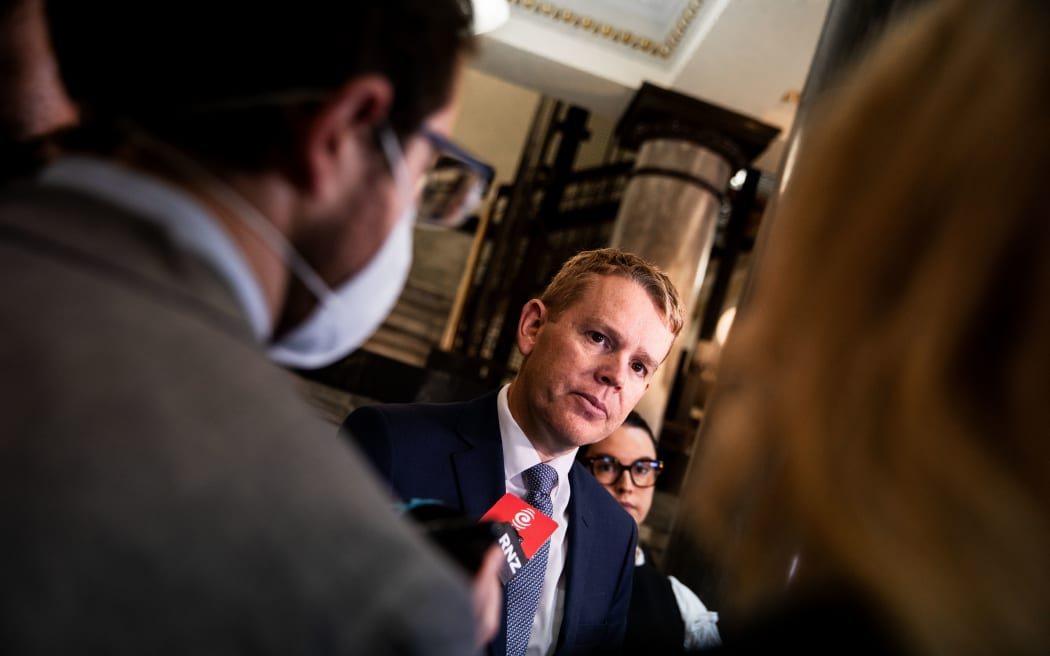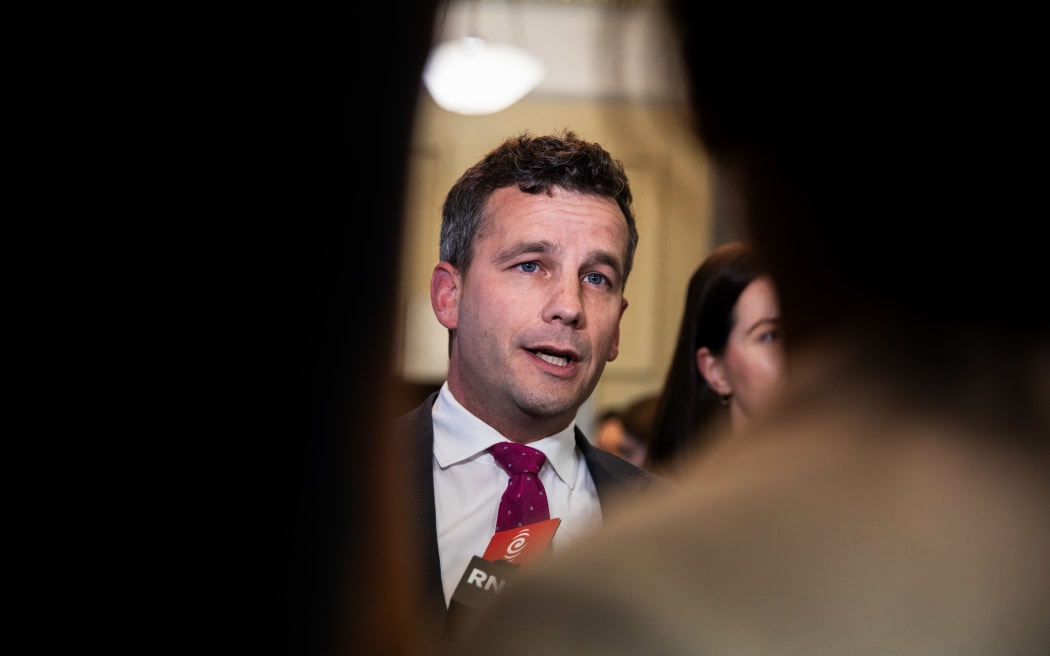
Labour leader Chris Hipkins at Parliament (File photo) Photo: RNZ / Samuel Rillstone
The opposition has attacked the government's Budget Policy Statement, saying it is further proof the government's numbers and tax cut promises don't add up.
Finance Minister Nicola Willis unveiled the BPS on Wednesday afternoon, pointing to worsening economic circumstances than predicted in December.
She pointed to tax cuts as the centrepiece of the Budget due in May without borrowing more, and - unlike previous governments - pushed out the announcement of an operating allowance to then, although she signalled it would be lower than the $3.5 billion set out in the half-year update (HYEFU).
Labour leader Chris Hipkins said that delay showed the "level of dysfunction that this government seems to be operating under".
"It's a combination of hypocrisy and incompetence, really," he said.
"I think everybody assumed that because they were taking such a long time to do it, it was because they were figuring out what it was going to be.
"They can't even answer the most fundamental question, which is how much money they're going to spend in the Budget. Ministers of Finance have always given an indication of what the Budget spending allowance is going to be."
Labour's new Finance spokesperson Barbara Edmonds said it pointed to a lack of agreement over spending priorities.
"It just shows the coalition of chaos ... we were operating off a $2.8b operational allowance - we would have reviewed that - but if there is a slowdown in the economy, tax cuts aren't the way to put it into a more productive economy."

Barbara Edmonds at Parliament (File photo) Photo: RNZ / Angus Dreaver
Hipkins said the promised tax cuts were unaffordable and would mean cuts to services and higher inflation for longer.
"I think New Zealanders who voted for the National Party on the basis that they were being promised a $250 a fortnight tax cut got completely conned, and I think they have every right to be feeling pretty upset about that.
"Tax cuts will mean deeper cuts to New Zealand's public services - which as the disability community found out last week actually directly affects people's day to day lives - but also it means inflation will stay higher for longer because there's simply no way they're going to be able to meet all of the commitments that they've put out there without increasing borrowing and without increasing money into the economy.
"I think the reason that the Budget Policy Statement is so unclear is because they simply can't make their numbers add up."
She was asked what responsibility Labour took for a worsening economic outlook.
"Our numbers added up," she said. "And they were fiscally prudent and - based on the situation we're in today - if they were opened again we would re-look at it. We wouldn't be promising tax cuts."
She pointed to recent commentary by right-leaning economists warning the government against delivering tax cuts given the economic circumstances.
"Nicola Willis is the only person - or perhaps, her party - who believes that tax cuts is the way to go right now."
Green co-leader Chlöe Swarbrick agreed with that assessment.
"This government seemed absolutely bloody minded on delivering more of those trickle-down tax cuts at the expense of a more productive economy and investment of the public infrastructure that all New Zealanders rely on.
"You're seeing even right-wing economists and commentators say that [the government's] numbers don't add up and that they should be delaying these trickle-down tax cuts, so I think it's pretty clear to everyone across the board - bar this triple-headed hydra of a government - that they shouldn't be moving in the direction that they've indicated."

Green Party co-leader Chlöe Swarbrick, who is also the Revenue spokesperson. Photo: RNZ / Samuel Rillstone
She said governments both red and blue for a long time had maintained unequal and unfair tax settings, and the coalition was only doubling down on that - pointing to the previous government's report on high-wealth individuals last year.
She suggested the emphasis on cutting the public sector would only make the government's economic job harder.
"The government's made it really clear that they have a huge legislative work programme and that they want to do it quickly - yet they're gutting the public servants that they rely on in order to operationalise that. And again it simply doesn't add up - you cannot run a government on vibes."
Reducing regulations will help - Seymour
From the government side, ACT leader David Seymour said he was disappointed but not surprised by the worsening economic outlook.
"I think it's been clear for a while New Zealand faces a serious challenge with productivity and that is showing up in the GDP figures. If we want to have the things that a first-world nation expects then New Zealand is going to have to focus on productivity. We can't just grow GDP through population growth."
He said his work as minister of regulation would aim to help solve that problem.
"We believe that regulation is an absolutely critical aspect of driving productive growth, which is so important. People are spending more time in compliance activity, not enough time on productive activity, because the government puts so much regulatory burden on them."
He hinted his new Ministry of Regulation - a flagship ACT policy - could be in line for a substantial level of funding.
"We believe that it is worth spending some money on getting regulation right, and again you'll see that as a Budget detail," he said.

ACT leader David Seymour Photo: RNZ / Samuel Rillstone
Asked if it would be more expensive, he said it was "difficult to make cost savings on something that didn't previously exist".
"Obviously it's going to be done very leanly and efficiently - but we can't really cut if they were zero before."
The Ministry had been proposed to be funded at least in part by the savings from disestablishing the Productivity Commission.
He refused to say whether ACT's coalition agreement requirement for National's tax cuts to "ensure the concepts of ACT's income tax policy are considered" had achieved any traction in the Budget.
"The coalition agreement asks that ACT's tax concepts be explored, didn't necessarily say that they would be adhered to," he said.




